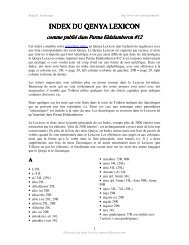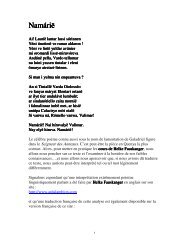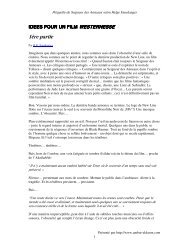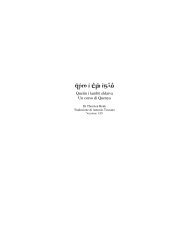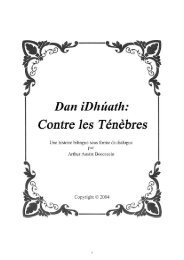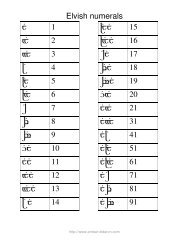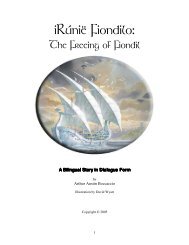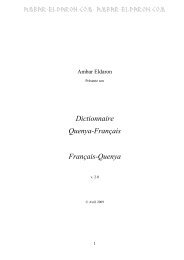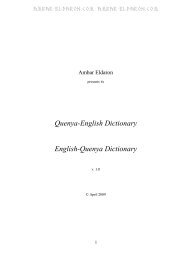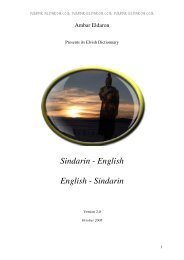Quenya Reverse Wordlist - Ambar Eldaron
Quenya Reverse Wordlist - Ambar Eldaron
Quenya Reverse Wordlist - Ambar Eldaron
You also want an ePaper? Increase the reach of your titles
YUMPU automatically turns print PDFs into web optimized ePapers that Google loves.
Helge K. Fauskanger http://www.uib.no/People/hnohf/<br />
caused fear to the Elves during the March; by the<br />
Exiles recognized as the cognate of Sindarin orch and<br />
used to mean "Orc". The Sindarin-influenced form<br />
orco was also used. (WJ:390)<br />
ocruar rauco ("k") "a powerful, hostile, and<br />
terrible creature", especially in the compound<br />
Valarauco "Demon of Might" (WJ:415, cf.<br />
SA:raukor. In the Etymologies, stem RUK, the gloss<br />
is "demon".) In the compound Valaraucar "Balrogs",<br />
the pl. of rauco is surprisingly #raucar instead of<br />
*raucor.<br />
ocruT Turco see Turcafinwë<br />
ocsur rusco "fox" (PM:353)<br />
ocuac cauco ("k") "humpback" (LT1:257)<br />
ocuaN Nauco ("k") "Dwarf" (capitalized in<br />
WJ:388, but not in Etym, stem NAUK). Naucalië<br />
(not *Naucolië) the "Dwarf-people" as a whole. From<br />
nauca. See also Picinaucor.<br />
ocuan-aytiP #Pitya-nauco pl. Pitya-naucor<br />
"Petty-dwarves" (cf. nauco) Also Picinaucor<br />
(WJ:389)<br />
ocuaniciP #Picinauco pl. Picinaucor ("k")<br />
"Petty-dwarves" (cf. nauco). Also Pitya-naucor<br />
(WJ:389)<br />
ocuaralam malarauco "balrog, demon"<br />
(RUK - rather valarauco in mature <strong>Quenya</strong>)<br />
ocuaralaV Valarauco ("k") "Demon of<br />
Might" (here vala- assumes its basic meaning "power,<br />
might"), Sindarin balrog (WJ:415). Pl. Valaraucar<br />
(sic, not -or) "Balrogs" (SA:val-, SA:rauco). Earlier<br />
forms from the "Qenya Lexicon" are Valcaraucë,<br />
Malcaraucë (q.v.); these should probably be ignored<br />
in mature <strong>Quenya</strong>.<br />
ocuit tiuco ("k") "thigh" (TIW)<br />
odlatsA Astaldo "the Valiant", a title of<br />
Tulkas (Silm, MR:438); replaced Poldórëa.<br />
odlE Eldo archaic variant of Elda, properly<br />
one of the "Marchers" from Cuiviénen, but the word<br />
went out of use (WJ:362, 374)<br />
odlemadlE #Eldameldo pl. Eldameldor<br />
"Elf-lovers" (WJ:412)<br />
odles seldo (meaning not clear, perhaps the<br />
masculine form of seldë "child", hence *"boy") (SEL-<br />
D)<br />
odlic cildo ("k") "one saw" (MC:220; this is<br />
"Qenya"; cf. cildë)<br />
odliH #Hildo pl. Hildor "the Followers", an<br />
Elvish name of Mortal Men as the Second-born of<br />
Ilúvatar (WJ:387).<br />
odlin nildo "friend" (apparently masc.;<br />
contrast nildë) (NIL/NDIL)<br />
odlogn ngoldo see noldo<br />
odlognI Ingoldo masc. name; possessive<br />
Ingoldova "Ingoldo's" (VT39:16)<br />
odlon noldo "one of the people of the<br />
Noldor", "one of the wise folk, Gnome". Cf. the gloss<br />
52<br />
"Gnome" in early "Qenya" (LT1:262). Also name of<br />
tengwa 19. Originally pronounced ngoldo (also spelt<br />
ñoldo by Tolkien, ÑGOLOD); initial ng had become<br />
n in Third Age pronunciation (Appendix E). Pl.<br />
Noldor ("Ñoldor"), "the Wise", name of the second<br />
clan of the Eldar (WJ:380, 381)<br />
odna ando "gate", also name of tengwa 5<br />
(AD, Appendix E)<br />
odnam mando "custody, safe keeping"<br />
(MR:350) or "prison, duress" (in Mandos, q.v.)<br />
(SA:band); Mando "the Imprisoner or Binder",<br />
usually lenghtened Mandos (MBAD (ÑGUR,<br />
GOS/GOTH, SPAN) )<br />
odnamagnA Angamando "Iron-gaol",<br />
Sindarin Angband (MR:350). The Etymologies gives<br />
Angamanda "Angband, Hell", lit. "Iron-prison"<br />
(MBAD). Older "Qenya" has Angamandu "Hells of<br />
Iron" (or pl. Angamandi) (LT1:249)<br />
odnamalaC Calamando ("k") "Light<br />
Mando" = Manwë (MBAD, (KAL, MANAD) )<br />
odnamiroM Morimando "Dark Mando" =<br />
Mandos (MBAD)<br />
odnaN #Nando pl. Nandor name of the<br />
Green-elves (Laiquendi). The primitive word<br />
*ndandô, whence <strong>Quenya</strong> Nando, implied "one who<br />
goes back on his word or decision", since the Nandor<br />
left the March from Cuiviénen to Aman. Adj.<br />
Nandorin. (WJ:412)<br />
odni indo "heart, mood" (ID, obsoleting<br />
earlier "Qenya" indo "house" in LT2:343); "state"<br />
(perhaps especially state of mind, given the other<br />
glosses) (VT39:23); indo-ninya a word occurring in<br />
Fíriel's Song, translated "my heart". Read *indonya<br />
in mature <strong>Quenya</strong>?<br />
odnil lindo "singer, singing bird" (LIN 2 )<br />
odnilem melindo "lover" (m.) (MEL)<br />
odniliut tuilindo "swallow", etymologically<br />
"spring-singer" (TUY, LIN 2 , LT1:269, LT2:388)<br />
odniloc colindo "bearer", in cormacolindor<br />
(q.v.)<br />
odnim mindo "isolated tower" (MINI)<br />
odnimoroc coromindo ("k") "cupola, dome"<br />
(KOR)<br />
odniruT Turindo (masc. name, see Túrin).<br />
(TUR)<br />
odniS Sindo (Þ) name of Elwe's brother<br />
(THIN)<br />
odno ondo "stone" as a material (UT:459,<br />
GOND). Pl. ondor in an earlier variant of Markirya;<br />
partitive pl. locative ondolissë "on rocks" in the final<br />
version<br />
odnoh hondo "heart"; hondo-ninya "my<br />
heart", changed to indo-ninya (FS, earlier version)<br />
odnomiaT Taimondo, also Taimordo<br />
"Orion" (LT1:268; Orion is called Telumehtar or<br />
Menelmacar in mature <strong>Quenya</strong>)<br />
Presented by http://www.ambar-eldaron.com



